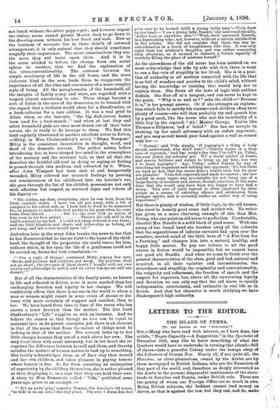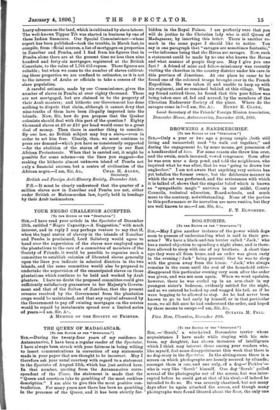LETTERS TO THE EDITOR:
THE ISLAND OF PEMBA.
[To THE Enrroa OF THE "SPECTATOR."] SIR,—Many who have read with interest, as I have done, the article, "Negro Capacity.—A Suggestion," in the Spectator of December 28th, may like to know something of what the Quakers would have to undertake in turning that island—full of slaves—into a peaceful Colony under the benign sway of the followers of George Fox. Nearly all, if not quite all, the Shambas, or clove-plantations, owned by the Arabs, are by them mortgaged to British Indians, who are the financiers of that part of the world, and, therefore, as deeply interested as the Arabs in the present disgraceful continuance of the slave-, trade in Zanzibar and Pemba, under British rule. These are the gentry of whom our Foreign Office are so much in awe. Being British subjects, the Indians cannot lend money on slaves, as that is against the law, but they can, and do, make
heavy advances on the land, which is cultivated by slave-labour. The well-known Tippoo Tib was started in business by one of these Indian financiers. Our Special Commissioner—whose report has been published—took the trouble, in March last, to compile, from efficial sources, a list of mortgages on properties in Zanzibar and Pemba, and I find from his figures that in Pemba alone there are at the present time no less than nine hundred and forty-six mortgages, registered at the British Consulate, to the value of 1,764 4.53 rupees. These figures are reliable ; but when we come to the number of slaves cultivat- ing these properties we are confined to estimates, as it is not to the interest of Arabs or officials to take a census of the slave population.
A careful estimate, made by our Commissioner, gives the number of slaves in Pemba at over eighty thousand. These are not mortgaged, but are claimed to be the property of their Arab masters ; and hitherto our Government has done nothing to dispute that claim, although it cannot deny that nine-tenths of them have been illegally imported into the islands. Now, Sir, how do you propose that the Quaker colonists should deal with this part of the question F Eighty thousand slaves at £8 or £10 per head would come to a great deal of money. Then there is another thing to consider. By our law, no British subject may buy a slave,—even in order to set him free. Clearly, then, we must continue to press our demand—which you have so consistently supported —for the abolition of the stains of slavery in our East African Protectorate. When that is carried oat, it might be possible for some scheme—on the lines you suggest—for making the hitherto almost unknown island of Pemba not cnly a financial success, but a centre of civilisation of the African negro.—I am, Sir, &C., CHAS. H. ALLEN, Secretary.
British and Foreign Anti-Slavery Society, December 31st.
P.S.—It must be clearly understood that the quarter of a million slaves now in Zanzibar and Pemba are not, either under British or Mahommedan law, legally held in bondage by their Arab taskmasters.















































 Previous page
Previous page